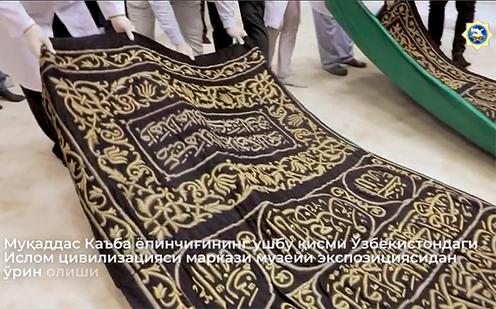A piece of the kiswa—the cloth that annually adorns the door of the sacred Kaaba—has been brought to Tashkent from Saudi Arabia, the press service of the Center for Islamic Civilization reported.
The kiswa has been delivered to Uzbekistan for the first time, on the initiative of President Shavkat Mirziyoyev. It will become part of the museum collection at the Center for Islamic Civilization, which is scheduled to open at the end of August. The sacred artifact was received by a group of scholars and clerics, led by the center’s director, art historian Firdavs Abdukhalikov.
The kiswa is a black silk covering embroidered with gold thread, draped over the walls of the Kaaba, the sacred stone structure in Mecca that is considered the physical center of Islam. The cloth is replaced each year; the removed kiswa is cut into pieces and distributed to certain individuals, officials, museums, and institutions. The fragment sent to Uzbekistan measures 6.3 meters in length and 3.3 meters in width.
According to tradition, the pre-Islamic custom of covering the Kaaba dates back to the Himyarite king Asad al-Kamil (4th–5th centuries). During the Prophet Muhammad’s lifetime, the kiswa was produced in Yemen; later, it began to be made in Egypt. In the early 20th century, by decree of Saudi Arabia’s first king, Abdulaziz ibn Saud, a special weaving factory was established in the kingdom for its production. Around 200 male weavers are employed there today.
The Center for Islamic Civilization is a project initiated by President Shavkat Mirziyoyev as part of promoting the idea of enlightened Islam as a religion of kindness, peace, and tolerance. The institution houses a unique museum consisting of five thematic halls.










